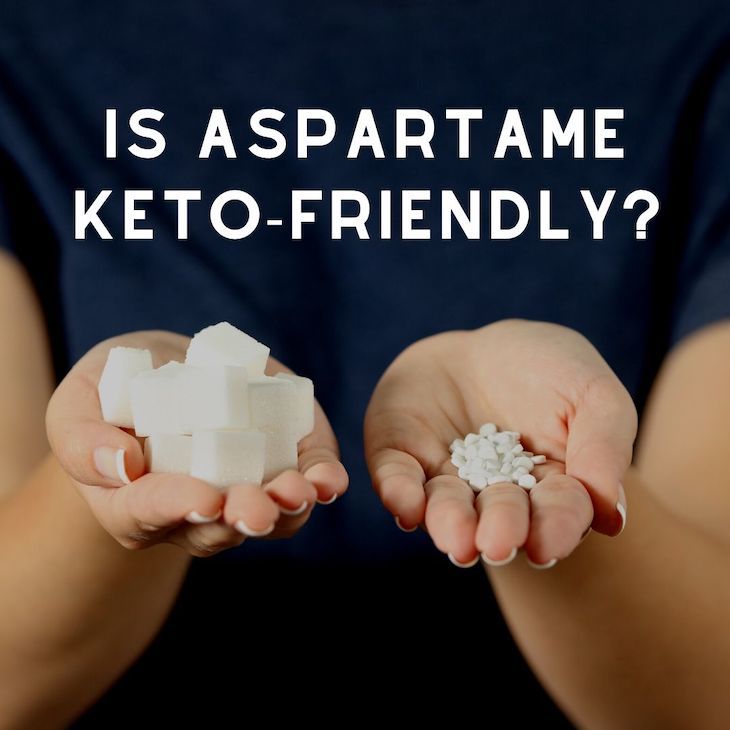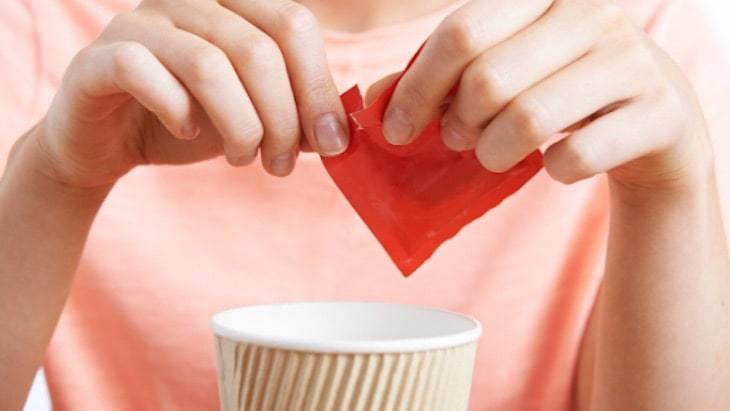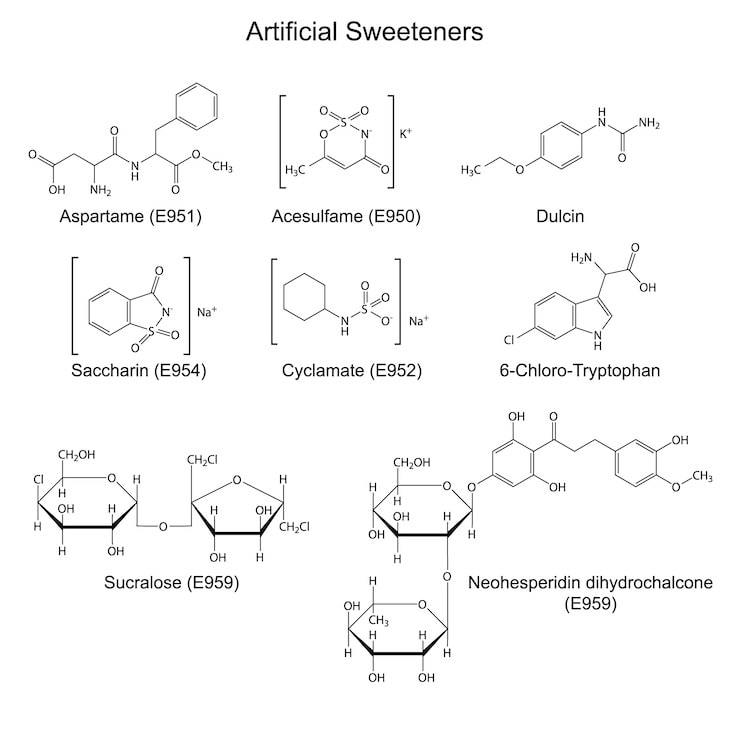
Not too long ago options were very limited when it came to sugar substitutes. You could choose between the pink packet and the blue packet, and that was about it.
Flash forward to today, and thankfully there are now many products that help us to ditch white sugar without sacrificing sweetness.
One of the earliest sugar substitutes, aspartame, has managed to stand the test of time. It continues to be a giant among sugar substitutes in the food industry, despite many competitors emerging in recent years.
But is this a good thing? And is aspartame a good choice for people on a Keto diet?
What is Aspartame?
Aspartame is the artificial sweetener found in products like Nutrasweet®, Equal® and Sugar Twin®. It was approved by the US Food and Drug Administration (FDA) in 1981.
Since then it’s commonly found in products like ice cream, breakfast cereal, chewing gum, prescription medications, supplements, and Diet Coke. It loses its sweetness when exposed to high temperatures, so it’s not used in cooking or baked goods.
Aspartame contains 4 calories per gram – the same as sugar. However, because aspartame is about 200 times sweeter than sugar, only very small amounts are needed.
The result is a sweet taste with far fewer calories and carbohydrates.
 So…Is Aspartame Keto?
So…Is Aspartame Keto?
Before we go any further, let’s get right to the point.
Aspartame is not the best sweetener to use on Keto.
And fortunately, there are now better options available.
Having a diet cola now and then isn’t going to completely derail your Keto diet. But if you’re taking the time to build healthier habits, aspartame is not the best sweetener to use.
Is Aspartame Safe?
 Aspartame has been extensively studied to evaluate its effects on the human body. Much of the available research indicates it’s safe for the general public, within reasonable limits. (1)
Aspartame has been extensively studied to evaluate its effects on the human body. Much of the available research indicates it’s safe for the general public, within reasonable limits. (1)
The FDA has set the Acceptable Daily Intake (ADI) for aspartame at 50mg per kilogram (23mg per pound) of body weight per day. (1)
For example, a 12oz. diet cola contains about 180mg of aspartame. The average 150-pound person, therefore, would need to consume no more than 19 diet colas daily to stay within the ADI. Easy enough!
But still – is aspartame on Keto a good idea?
Why Aspartame Is Best Avoided on Keto
Contrary to some of the safety studies, there is scientific research showing that regular intake of aspartame can have unwanted side effects.
A 2018 analysis looked at some of the negative effects of aspartame. They found that this sweetener can act as a chemical stressor, increasing the hormone cortisol. (1)
This can then contribute to insulin resistance, the very thing many of us on Keto are trying to reverse or prevent.
In animal studies, aspartame has caused hormonal imbalances, resulting in increased appetite and food intake, decreased energy expenditure, and increased fatigue. (1)
Other studies have found that aspartame can have negative effects on the gut microbiome, resulting in growth of pathogenic bacteria. (1) These changes to the gut can then result in worsened glucose tolerance. (1)
All of this adds up to worse health outcomes, and trouble staying in ketosis.
But it doesn’t end there!
 A 2017 scientific review found that even within doses that are considered acceptable, aspartame can induce oxidative stress and damage cell membranes, leading to systemic inflammation. (1)
A 2017 scientific review found that even within doses that are considered acceptable, aspartame can induce oxidative stress and damage cell membranes, leading to systemic inflammation. (1)
Chronic inflammation is associated with a wide array of deadly health problems, including heart disease, Alzheimer’s disease, cancer, and type 2 diabetes.
More human studies are really needed to help settle the debate. In the meantime, it might be a good idea to explore less controversial options to get your sweet fix.
Aspartame vs Sucralose: Which is Better?
Sucralose joined the commercial sweetener scene in 1992 and gained FDA approval as a general-purpose sweetener in 1998.
 It is an artificial sweetener and sugar substitute made with a chemical process that combines chlorine and sucrose (table sugar) molecules. The result is a product that is about 600 times as sweet as sugar, yet has zero calories and carbohydrates.
It is an artificial sweetener and sugar substitute made with a chemical process that combines chlorine and sucrose (table sugar) molecules. The result is a product that is about 600 times as sweet as sugar, yet has zero calories and carbohydrates.
Sucralose is sold under the brand name Splenda® (though not all Splenda® products contain sucralose.) It’s also an ingredient in thousands of other products.
It may come as a surprise that sucralose products – like Splenda® – typically include additional ingredients that aren’t particularly keto friendly. That little yellow packet also contains dextrose and maltodextrin, which add additional sweetness and bulk, making it look at taste more like sugar.
Is Sucralose safe?
The Acceptable Daily Intake (ADI) for sucralose was set at 5mg/kg of body weight per day in the US. For a 150-lb person, that’s roughly the equivalent of 8 sucralose-sweetened cans of soda.
Again, that’s a limit most people have no trouble staying within.
But as with aspartame, sucralose has been the subject of extensive study, and the results have been controversial.
The makers of sucralose claim it can be heated without losing its sweet taste. It is sold in bulk (with maltodextrin added) to be used in cooking, as a substitute for granulated sugar.
Unfortunately, studies have shown that sucralose produces a harmful compounds when exposed to high temperatures. (1, 2) So maybe it’s not the best sweetener to use in your Keto cookie recipes after all.
 Sucralose also disrupts the gut microbiome. It kills the good lactobacillus and bifidobacteria strains, and reduces the overall quantity and diversity of microbes living in the gut. (1)
Sucralose also disrupts the gut microbiome. It kills the good lactobacillus and bifidobacteria strains, and reduces the overall quantity and diversity of microbes living in the gut. (1)
A 2013 study found that sucralose had a negative effect on blood sugar and insulin, causing both to increase more than the control group. (1) Because increased blood sugar will kick you out of ketosis, this spells trouble for those following a Keto diet.
Bottom Line: Aspartame vs Sucralose
Both are very low in calories and carbohydrates. Both could cause problems for maintaining ketosis and for the health of the microbiome. Neither one is good to bake with.
We recommend different sweeteners altogether. Fortunately, there are great products available to make cooking and shopping for keto friendly foods much easier.
The Best Sweeteners for Keto
The sweeteners we love for people following a ketogenic diet are the ones that taste the best and have the fewest unwanted side effects:
 All of these are safe and hold up well at high heat, making them great for baking. The available research indicates they tend to have neutral or positive effects on the gut microbiome. They’re also associated with stable or improved blood sugar levels.
All of these are safe and hold up well at high heat, making them great for baking. The available research indicates they tend to have neutral or positive effects on the gut microbiome. They’re also associated with stable or improved blood sugar levels.
Frequently Asked Questions
1. Is aspartame Keto friendly?
No, aspartame is not keto friendly. It can indirectly increase in blood sugar and insulin, which would interfere with ketone production. Plus, studies show it may have a bad impact on overall health if consumed regularly.
2. Does aspartame affect ketosis?
Aspartame might kick you out of ketosis. You can test for yourself by measuring blood ketones before and after consuming aspartame.
3. Does aspartame keep you awake?
Yes, there are several ways aspartame can keep you awake when you’d rather be sleeping.
It acts as a chemical stressor, increasing the hormone cortisol. Too much cortisol can interfere with sleep. (1)
Aspartame can also disrupt neurotransmitter function in the brain, leading to reduced serotonin activity. This too can cause sleep problems. (1)
4. Does aspartame contain formaldehyde?
Yes. When aspartame is digested it’s broken down into a number of components that include aspartic acid, phenylalanine, and methanol (which is a potentially toxic substance on its own!).
Methanol is further broken down into formaldehyde and formic acid.
Now, to be fair, we are routinely exposed to natural sources of formaldehyde, and in fact our bodies produce a certain amount of the stuff.
Still, It’s not something we really want more of, when there are far better options for getting a sweet fix!
Say No to Aspartame on Keto
Aspartame (and sucralose!) should be avoided on Keto. While these artificial sweeteners are low in carbs, other factors make them all wrong for those seeking to improve their health.
Instead try one of our recommended sweeteners. Stevia, Erythritol, Monk Fruit, and Swerve are all good options for enjoying the sweeter things in life while cutting the carbs.
